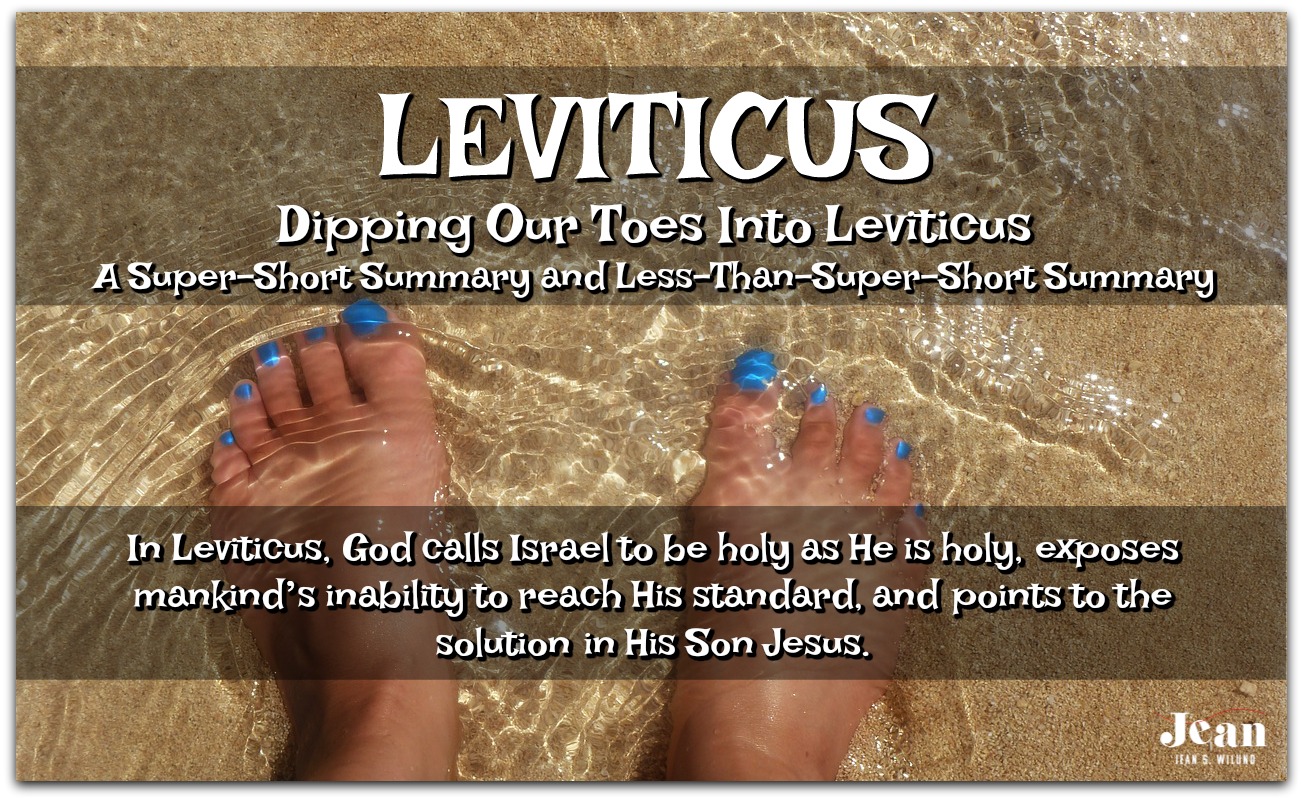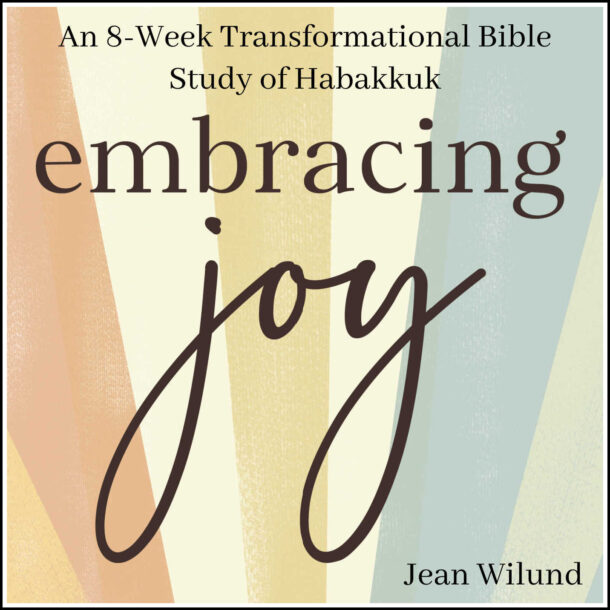3. LEVITICUS
Super-Short Summary:
In Leviticus, God calls Israel to be holy as He is holy, exposes mankind’s inability to reach His standard, and points to the solution in His Son Jesus.
Less-Than-Super-Short Summary:
The essence of Leviticus is God’s holiness.
Holiness is something or someone set apart from what is unclean/unholy and devoting it instead to what is pure.
Through a series of laws, rules, and regulations, God called Israel (Leviticus 20:26)—and later Christians (I Peter 1:15)—to be holy as He is holy. That’s extreme holiness. (Actually, holiness can’t be less than extreme or it’s no longer holy.)
God’s call was a problem for Israel because not even they, God’s chosen people, stood a chance at reaching His standard of holiness on their own. (I refer you back to Genesis and the born-with-sin problem Adam and Eve passed down.)
God’s promised solution would come through His perfect Son Jesus Christ, but Jesus wasn’t coming in their day. They needed a temporary solution. Leviticus details it. (And by “details it”, I mean DETAILS it. That may be what’s kept Leviticus from becoming the next blockbuster movie—or even a made-for-TV movie.)
Laws, Rules, & Regulations
Leviticus overflows with laws, rules, and regulations to lead Israel into holiness.
Tradition says God gave Israel 613 laws. (And we thought it was impossible to keep all Ten Commandments perfectly. It is.)
As complex as they were, Israel needed God’s laws because He was now living among them. Just as we teach our children the rules for handling fire so they don’t get burned and die (Don’t touch!), Israel needed to understand how to approach God so they didn’t come the wrong way and die. (Mankind’s sin and God’s holiness don’t mix.)
The Offerings
One of the ways Israel could live in the midst a holy God was through the giving of five major offerings: the burnt offering, grain offering, peace offering, sin offering, and guilt offering (Leviticus 1:1-6:7).
The offerings helped the Israelites receive forgiveness and worship God. They also taught them more about God’s nature and pointed to Christ.
The Holy Festivals
Besides the five offerings, God required Israel to observe seven holy festivals: Sabbath, Passover, Firstfruits, Weeks, Trumpets, Day of Atonement, and Booths (Leviticus 23:1-25:55).
We’ll discuss the offerings and festivals another day, but for now, understand that besides keeping them safe in their sinful state in the presence of a holy God, each taught them important truths about God’s nature and what Jesus would do in the future.
Clean and Unclean
Leviticus talks a lot about clean versus unclean (Leviticus 11:1-15:33).
God wasn’t referring to the need for a bath. These terms indicated whether the people were prepared and allowed to approach God (Clean) versus unprepared and prohibited (Unclean).
It also referred to whether an animal was permitted to be eaten (clean) or not (unclean).
Perhaps this analogy of my youngest daughter, a certified skydiver, will help explain what it meant for the Israelites to be clean or unclean:
Clean and Unclean Skydiving
While my daughter was getting her skydiving certificate, her instructors required her to follow specific rules and wear the prescribed equipment before they would deem her prepared and allowed to hurl herself from a plane. She was clean.
If she didn’t jump again within a certain number of days, however, it didn’t matter if she followed the rules and wore the right equipment. They’d deem her unprepared and prohibited from jumping. She would be unclean.
Once she took the required refresher course, followed the rules, and wore the proper equipment, they’d pronounce her once again prepared and allowed to plummet from a plane toward the ground at about 120 mph with only a thin piece of fabric to keep her safe. She would once again be clean. (Crazy, but clean.)
Likewise, the Israelites had rules to follow. (Apparently 613 of them).
If they broke certain rules, God deemed them unclean. But after they performed the proper rituals, the priests could once again pronounce them clean and they could approach their holy God.
(Leaping from a plane without a parachute is safer than approaching a holy God the wrong way. The chilling story of Nadab and Abihu can attest to that—Leviticus 10:1-20).
The Priesthood
With all the offerings God required the Israelites to bring, the number of ways they could become unclean, and the important festivals they were to hold, the Israelites needed help. Thus, God instituted the priesthood, which we saw in Exodus (Exodus 28:1-29:46).
The priests served in the tabernacle, taught the people His law, and prayed for God’s guidance.
There were many priests but only one high priest. In Leviticus, God ordained Israel’s first high priest, Aaron ( Leviticus 8:1-10:20). Aaron was Moses’ brother.
God allowed only the high priest to enter the Most Holy Place (AKA the Holy of Holies) because God’s presence dwelled there over the Mercy Seat (God’s throne).
The high priest entered on the annual Day of Atonement. This most important day centered around the high priest and two goats. One goat paid the price for the sin of the nation, the other carried their sin as far as the east is from the west (Leviticus 16, Leviticus 23:37-44).
On this day, more than any other, the high priest portrayed a vivid picture of Jesus. But he wasn’t a perfect picture.
The high priest had to step through the curtain into the Most Holy Place with the blood sacrifice every year. Jesus’ death removed the curtain forever. He died one time for all time for all sin.
The Rewards of Leviticus
The book of Leviticus lies unread by many a Christian, its pages as crisp as the day they bought their Bible. It’s touted as the book few want to read. After all, it talks of bodily discharges, scabs, and other unsavory stuff.
But anyone who ventures into Leviticus and looks for Jesus will find treasures. Powerful pictures of Jesus, His plan of salvation, and how Christians ought to live to resist sin rise from its pages.
Leviticus may never become your favorite book, but it rewards any who choose not to thumb past it, but rather to linger in it.
At the very least, it will make you grateful to Jesus for fulfilling the law and bringing an end to the sacrificial system.
Jesus was and is the final sacrifice. Perfect in every way. Amen.
[bctt tweet=”Dip your toes into Leviticus, and find out what treasures you’ve been missing. #Biblestudy #GodsWord #GodisHoly #ReadTheBible” username=”jeanwilund”]








Hey, Jean! Thanks for the time well-spent in reading your words, as always. It reminded me of our Sunday School class yesterday. Right in the midst of my explanation of the purposes of studying Nehemiah, one of our visitors queried, “So, what’s a version anyway? … And the Old and New thing you keep talking about?” Needless to say, I thought immediately of your recent posts and the real need for Christians to have resources for searching people who have no clue about the Old and New Testaments and the ways that each book points to Jesus. Obviously, we didn’t get through my planned Nehemiah study; but, we tackled really important things, those same foundational principles of which you often write. I was happy to tell him and his girlfriend that one of my friends has a blog that would be of major interest! That’s really important work you are doing!
Thanks, Jennifer. I’m so glad this series is helpful. It was actually born out of the same need. I wanted to be able to give a friend who was unfamiliar with the Bible information that didn’t require a Bible degree to understand. People like me! I couldn’t find one, so I figured I’d better start writing it. haha! Thanks for sharing my blog with them. Grace & peace! Jean